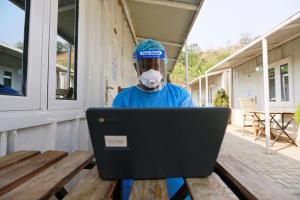Countering COVID-19 Misinformation in Africa: On a continent of 1.3 billion people, WHO and partners are working to reduce social media-driven health myths
Amid the COVID-19 pandemic, an infodemic has also emerged. Infodemics occur when people are flooded with information—a combination of facts and myths on any given topic. This tsunami of information causes consumers to struggle to understand what sources they can trust.
Africa has seen a deluge of coronavirus-related fictions online over the past year. For example, in May 2021 in Kenya, false claims about COVID-19 vaccines affecting the menstrual cycle began to circulate online. Harmful rumors like these can quickly go viral and disrupt vaccination campaigns. A similar issue occurred in northern Nigeria in 2003 when polio vaccination campaigns were disrupted for 11 months. Political and religious leaders in the states of Kano, Zamfara, and Kaduna were advising parents to avoid immunizing their children, saying the shots could be contaminated with anti-fertility agents, HIV, and cancer-causing agents. Some claimed the polio vaccines were tainted by "evildoers" from western countries.
On a continent of 1.3 billion people, the World Health Organization (WHO) and its partners are working to cut through the noise on social media to provide accurate guidance on COVID-19. At theAfrica Infodemic Response Alliance(AIRA), an initiative of WHO and partner organizations launched in December 2020, we spot misinformation with our social media "listening tools" and track it as it quickly goes viral. Immediately, we create a video debunking the rumor and provide accurate information.
To debunk the menstrual cycle rumors, we produced a video featuring Dr. Phionah Atuhebwe, a vaccine introduction specialist at the WHO Regional Office for Africa. In the film, she says, "There is no evidence that the COVID-19 vaccine can affect the menstrual cycle."
If there are any changes in a woman's menstrual cycle, she adds, "They should be temporary and harmless… if you are worried, please contact a health professional."
The Africa Science Media Centre distributed the video to its network of journalists. In a few days, 1.8 million people had viewed it. We are currently translating the video into Kiswahili—spoken by millions of people in the east African country of Kenya—so that the Kenyan Ministry of Health can use it.
AIRA's tools scour social media for false claims about COVID-19 and counter them by spreading scientifically accurate information. The tools can spot problematic rumors by measuring how many people are sharing them, how fast they are spreading, and the emotion that the rumors are evoking. Once we produce a video countering a COVID rumor, our main challenge is ensuring that our content goes viral and reaches the audiences that are being fed misinformation. One of our strategies is to identify information gaps quickly and address them before false information starts to proliferate.
WHO Emergency Programme
Email: nguyent [at] who.int (nguyent[at]who[dot]int)
Infodemic Management Officer
WHO Regional Office for Africa
E-mail: cecchinis [at] who.int (cecchinis[at]who[dot]int)
Tel: +32471439127



